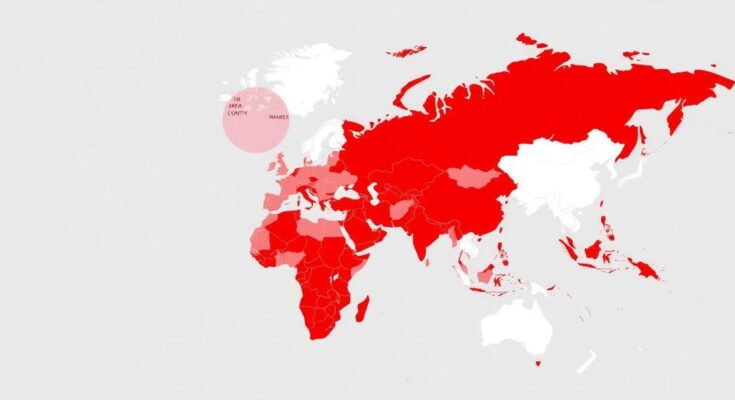The Trump administration is exploring an expansion of travel restrictions affecting citizens from up to 43 countries. This proposal categorizes nations into three tiers with varying levels of travel restrictions and is currently under review. Key concerns include the potential impact on diplomatic relations and individuals holding existing visas or green cards.
The Trump administration is considering expanding travel restrictions that could impact citizens from up to 43 countries. The New York Times reports that this new proposal is broader than previous travel bans explored during President Trump’s first term. Ultimately, the draft proposal is currently under review by internal officials, pending final adjustments based on diplomatic and security evaluations.
The proposal categorizes countries into three tiers: Red, Orange, and Yellow. This classification structure delineates the nature and extent of travel restrictions each group may face, and the specific countries included in the lists are subject to potential changes.
The Red list comprises 11 nations whose citizens would face a total travel ban from entering the United States. The listed countries include Afghanistan, Bhutan, Cuba, Iran, Libya, North Korea, Somalia, Sudan, Syria, Venezuela, and Yemen.
The Orange list identifies 10 countries that will experience strict visa restrictions. Citizens from these nations may still qualify for limited types of visas, requiring mandatory in-person interviews. The countries on this list include Belarus, Eritrea, Haiti, Laos, Myanmar, Pakistan, Russia, Sierra Leone, South Sudan, and Turkmenistan.
Countries on the Yellow list, totaling 22, will be given a 60-day period to address security and information-sharing deficiencies. If these concerns are not rectified, they risk being moved to a more restrictive classification. Countries on this list include Angola, Antigua and Barbuda, Benin, Burkina Faso, Cambodia, and others.
State Department officials, along with specialists from security and intelligence fields, are analyzing the draft proposal. They are assessing the validity of the deficiencies cited and the potential diplomatic repercussions of listing certain countries. The proposal may see revisions to align with international cooperation priorities.
Unresolved issues remain regarding how the proposed travel ban would affect individuals with existing visas or green cards and the influence on diplomatic relations, particularly with nations such as Russia and Venezuela.
This new proposal also renews discussions about the legal and ethical implications of such travel bans. During Trump’s initial tenure, courts blocked earlier versions, although a revised version was later upheld by the Supreme Court. President Biden previously annulled Trump’s travel bans, labeling them as detrimental to national integrity. Trump’s new executive order cites national security concerns as the rationale behind the reintroduction and expansion of these restrictions.
In summary, the Trump administration’s potential expansion of travel bans aims to categorize countries based on security and visa accessibility. The proposal indicates heightened restrictions, with a clear classification system being implemented. This consideration, however, invites legal and diplomatic debates surrounding the constitutionality and implications of such bans. The impact on existing visa holders remains uncertain, highlighting the complex international relations surrounding the issue.
Original Source: www.financialexpress.com




